One game short of the season’s midpoint of 41 games, the San Jose Sharks enter their five-day break. The timing is pretty good. The Sharks are on a three-game losing streak, albeit with two losses coming in overtime.
The season has been uneven for San Jose. The penalty kill started off one of the league’s best, the power play among the league’s worst. While special teams have been a major plus for San Jose, the two groups have opposite trajectories. The power play has sizzled in the last month, while the penalty kill has allowed goals in six straight games.
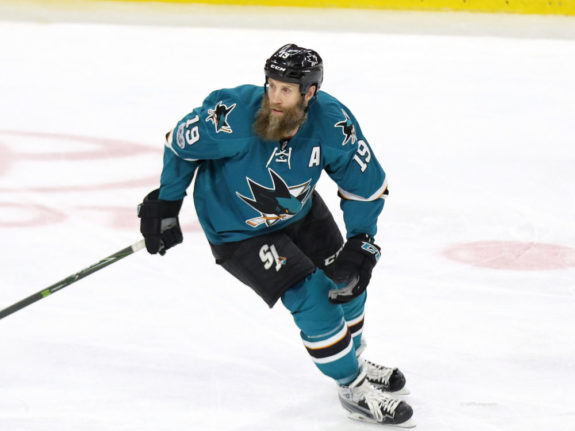
The recent five-game road trip featured the Sharks’ worst game of the season and their worst period of the season. The ‘worst game’ came in their 6-0 loss against the Dallas Stars. Their ‘worst period’ came when they gave up a 5-2 third period lead to the struggling Ottawa Senators and lost 6-5 just seven seconds into overtime.
Uneven Players
Martin Jones was a legitimate Vezina Trophy candidate 17 starts into the season. After a pair of difficult games to start the year, Jones went into lockdown mode, allowing only 6.1% of shots to get through over his next 15 games. In the last of these games against Winnipeg, Jones suffered a minor injury and missed about a week. Since his return, he has allowed goals at nearly twice the rate. In his most recent 11 games, 11.3% of shots have gotten past Jones (.887 save percentage).
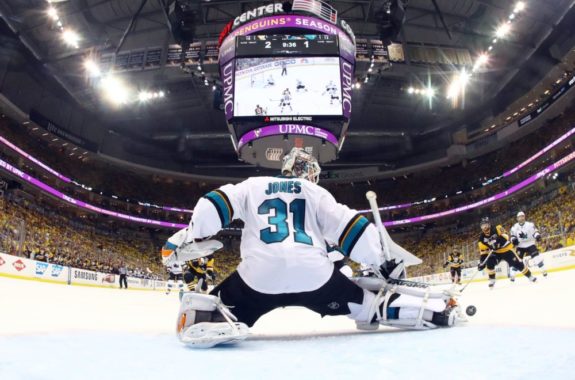
Brent Burns took 21 games to get his first goal of the season, and has been on a scoring tear since then. He has seven goals and 22 points in his last 19 games. However, he is also minus-nine in this span and his even-strength game continues a season-long decline. He now sits at minus-19, fifth worst in the entire league.
Burns, the reigning Norris Trophy winner, continues to draw praise from his coaches. But clearly, he is lost on defense. He is already below his career worst plus-minus rating, particularly disturbing since he is is coming off a career-best season, plus-19 as a defenseman (his best plus-minus rating, plus-26, came as a forward). If he can’t find his defensive game, the “Burns to forward” discussion will return.
It should be noted that Joakim Ryan, Burns’ partner for a number of games early in the season, sits at plus-six, tied for second best on the team with Marc-Edouard Vlasic. It’s not Burns’ partner dragging him down. Burns current partner is Brenden Dillon.
Dillon’s improved play early in the season earned himself an upgrade from the third defensive pair to the pairing with Burns. In early November, Dillon was plus-six. But once again, it’s been demonstrated that Dillon and Burns aren’t great together. In the last two months, Dillon is a minus-13.
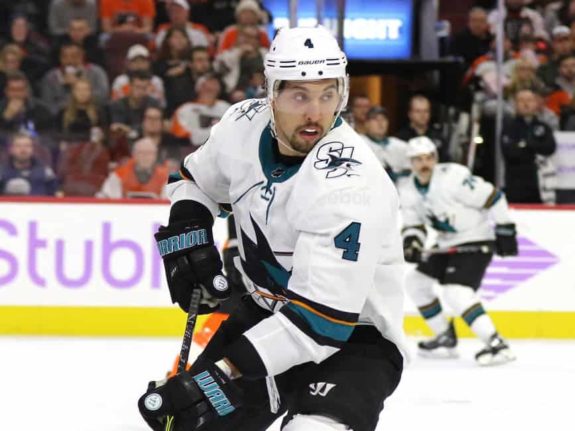
Joonas Donskoi is another uneven participant. He started out the season well, with a dozen points and a plus-three rating through Nov. 24. Since then, he has played only 13 games, delivered just three points and is minus-five.
The Best Stories
Tomas Hertl, Chris Tierney, and Aaron Dell have been among the Sharks best stories.
Hertl has been healthy and is playing a big role on the Sharks top line with Logan Couture. He has already exceeded his goal and point totals from his injury-diminished 2016-17 season.
Tierney, ineffective as a third line center in 2016-17 (but effective on the fourth line), has shown he is ready for the upgraded role this season. His ten goals are just one goal short of his 2016-17 total.
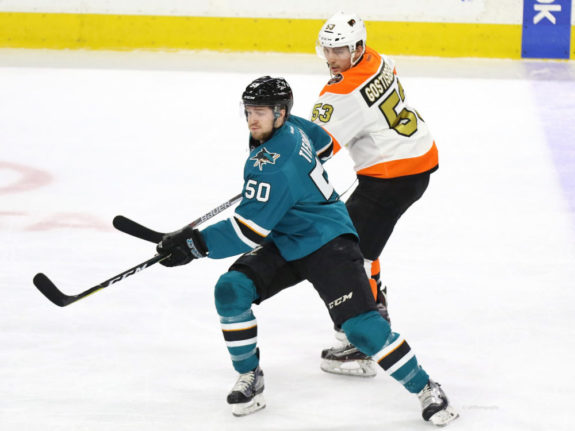
Backup goalie Aaron Dell was a good story last season, albeit in limited playing time. This season, he has been used considerably more. He has started 12 games and played in 16, which is on pace to greatly exceed his 17 starts and 20 games from last season. His .926 save percentage is tied for fourth in the league.
Perhaps the best under-the-radar story is the re-emergence of an old story. Once again, Justin Braun and Marc-Edouard Vlasic are the Sharks best defensive pairing. Braun has 16 points and is plus-nine, while Vlasic has 11 points and is plus-six, all while competing against other teams best forward lines. While Vlasic’s season projects to a comparable season to his prior season, Braun has already exceeded his point total from 2016-17 and is on track for a career best. His plus-minus is also far better than last season.
The Second Half Set-Up
The Sharks play in the Pacific Division of the Western Conference. A minimum of three teams will make the playoffs from the Pacific Division and eight will make it from the Western Conference. The Sharks project to 98 points, which will get them a playoff berth, albeit with little room to spare. Indeed, 12 of the Western Conference’s 15 teams project for over 90 points.
There are plenty of things which can change a team’s trajectory, from trades to injuries to hot streaks. The Sharks are in a good position, but it seems they will on the playoff bubble for much of the rest of the season. As constructed, this team is capable of being a playoff team, but too much needs to go right for the Sharks to pull away from the pack and cruise into the postseason.
There is better news. Make the playoffs and the Sharks have a chance to go far. None of the teams in the Western Conference suggest greatness. Vegas has the best record in the West, but don’t possess the sort of top-end talent usually needed for a deep playoff run. Winnipeg has the next best record – they project to 109 points. Very good, but hardly dominant.
The Challenges
The challenges for the Sharks are numerous. Brent Burns needs to find his defensive game. Martin Jones needs to return to his formerly sharp self. Both Joe Thornton (minus-11) and Joe Pavelski (minus-eight) need to be better at even strength – both are at career lows in plus-minus.
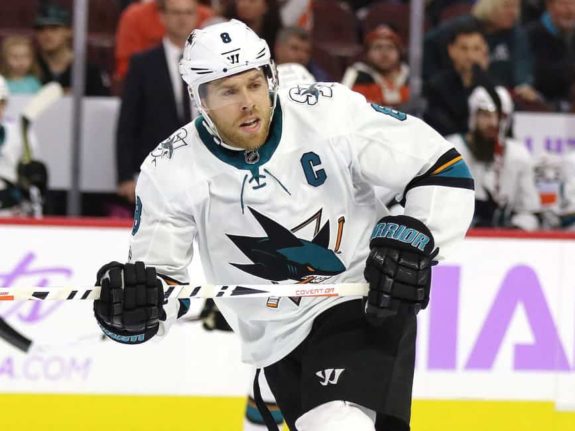
The team needs to stay relatively healthy, even as the schedule condenses for one of the league’s older teams. For example, they’ll exit the break with eight games in 13 days, then follow it up with an eastern trip which has five games in eight days. Between Jan. 30 and Mar. 1, the Sharks will play three back-to-back games, but have a three-day break only once. And beginning Mar. 20, the Sharks will play their final 10 games all against teams in playoff contention. This includes a stretch of seven games in 12 days.
The schedule is challenging, with a big risk coming from compressing so many games into the remaining weeks. The Sharks played their first 40 games in 95 days. They’ve played the fewest games in the league to this point (tied with the Boston Bruins and Ottawa). After this six-day break ends, the Sharks finish the season with 42 games in 84 days, even more aggressive than last season’s compressed schedule. Only the Bruins have an equal level of compression (not by design, but because of a weather-related postponed game).
The Coach
At the start of the season, I indicated this is the season we’d find out if head coach Peter DeBoer is the right person for the job. It’s time for DeBoer to get down to business. He needs to use the combinations which work and jettison those which don’t. The Burns-Dillon experiment needs to end. And if Burns can’t find his defensive game, DeBoer may have an even bigger decision to make.
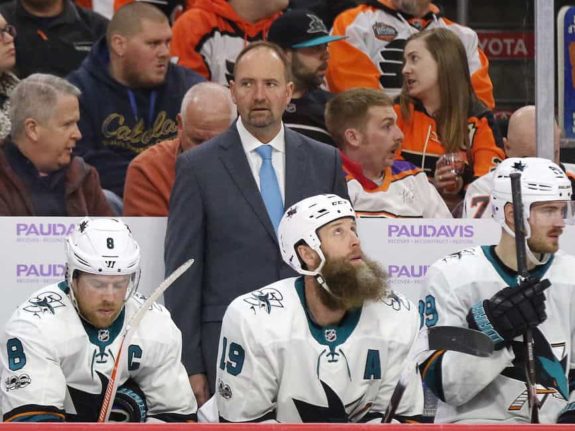
Another example is with the top line. Logan Couture and Tomas Hertl compose two-thirds of the Sharks top line. Two other players have filled the third spot effectively in Joonas Donskoi and Melker Karlsson. Recently, DeBoer put Kevin Labanc in this spot. Couture hasn’t been a ‘plus player’ in any of his last eight games, Hertl only once in his last 11 games. DeBoer needs to return Karlsson or Donskoi to the wing and restore the team’s most effective line. He needs to go with the player combinations which work.
Lastly, the compressed schedule requires DeBoer to be smarter than he was last season, when he admitted the team “ran out of gas” in the March timeframe. It is DeBoer’s job to make sure the team does not run out of gas. He’ll need to be better than he was last season.
The Fate of the Sharks
This team’s fate is a function of a number of factors. From coaching to trades to health to focus, the Sharks destiny is, for the most part, in their own hands. Whether they seize the opportunity is an open question.